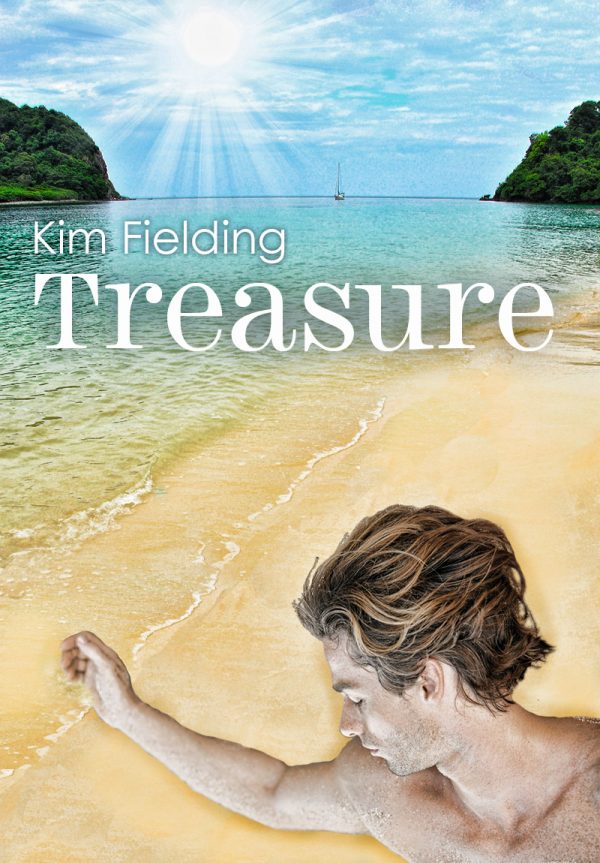by
Julian Massey has always been sickly. When the young man's parents send him to the seaside town of Urchin Cove to recuperate, he finds himself stranded in a tiny cabin with only the quirky local inhabitants for company. Then a storm blows through, and he finds an unexpected discovery washed up on the beach: an unconscious man.
After stealing a treasure, Kit Archer is taken prisoner by a ruthless pirate, Captain Booth. When a storm hits the pirate ship, Kit is able to escape, but not without serious injuries. Jules nurses him back to health, and friendship grows into desire. But Captain Booth is bound to come in search of his treasure and the man who stole it.
In a world with dragons, sprites, and wizards, it's going to take more than a little magic for Jules and Kit to find lasting happiness together.
- 3 To Be Read lists
- 6 Read lists
Cover Artists:
Genres:
Pairings: M-M
Tropes: Hurt / Comfort, Coming of Age, Magic Sword
Chapter One
The room smelled of dust, sour sweat, and bergamot. And of medicine. The heavy curtains were closed and Julian found the shadows oppressive, as though they had an actual weight and were pinning him to the chair. The darkness also seemed to muffle sounds, reducing the conversation in the hallway to senseless murmurs—his mother’s thin and high, his father’s and Dr. Brinkett’s deep and low.
The door opened with a groan, and Julian squinted against the light. His parents and the doctor entered in a small parade, his mother and Dr. Brinkett with false, bright smiles.
“Well now!” boomed Dr. Brinkett, making Julian wince. “And how are we feeling this afternoon, my boy?”
“Fine.” Julian kept his gaze on a gloomy painting of fruit in a bowl. He hated that painting. Why on earth hadn’t he removed it from his wall long ago?
READ MOREHis mother made a clucking sound. “You are not fine. You’ve hardly left your room, you won’t eat— Look at him, Doctor! He’s thin as a rail.”
Dr. Brinkett frowned. “How is your appetite, Julian?”
“It is fine. I am fine. I only… I only need peace and quiet.”
Julian’s father gestured at one of the room’s untidy stacks of books. “What you need is to stop filling your mind with all this rubbish and get out in the world. You will never regain your strength by turning pages.”
Julian compressed his lips. He’d never had much strength to begin with, as his father well knew. As a child, he’d always been the first to contract illnesses and the last to be cured of them. Whereas his older brothers had grown into big, strapping men with muscles as large as any laborer’s, Julian was shorter, slighter. His mother liked to say that he had a delicate constitution. Sometimes it felt as if he’d spent half of his twenty-five years ill in bed. During the long days of his confinements, it was only his books—the rubbish, as his father would have it—that provided companionship and allowed him to escape, in mind if not in body.
The doctor was a cheerful sort, prone to bad jokes and silly stories. He’d been tending to Julian for years and still treated him like a child. Now, Dr. Brinkett chuckled uncomfortably and rubbed his hands together. “We’ve a fine idea for you, Julian. One that will give you peace and quiet yet also expose you to fresh air and exercise.”
Narrowing his eyes skeptically, Julian asked, “What?”
“The seaside, my boy! The lovely seaside. And it is all arranged for you already. You shall travel by rail to Bythington. I have taken that journey myself; loads of beautiful scenery to admire along the way. But I expect Bythington itself is rather too… boisterous for your tastes. More of a place for mobs of young families. A coach shall take you from there two hours north to Urchin Cove, a quaint little village. Quite serene. I used to spend summers there myself when I was a boy. You shall have a cottage all to yourself, with the sandy beach right outside your door. And you shall have all the sunshine and bracing sea air you could want. Just the thing to make you well again.”
The doctor sounded like a tourism salesman. Julian didn’t care for the idea at all, but he could tell by the set look on his father’s face that decisions had been made and arguing would get him nowhere. Julian didn’t have the will to fight. Besides, what did it really matter where he was? He could be lonely at the seaside just as neatly as he could in the city, and it would be a pleasure to be away from his mother’s eternal hovering.
Perhaps Dr. Brinkett thought Julian needed more convincing, because he picked up the topmost book on the nearest pile and waved it around a bit. “You can have a bit of exercise in Urchin Cove. A walk on the beach, a bracing swim. And it may be that you will find a bit of adventure, just like in your books. A hidden treasure, perhaps.” He winked jovially.
Resigned to his fate, Julian squeezed his eyes shut. “When do I leave?”
He might have enjoyed the rail journey if he could have allowed the swaying motion to lull him to sleep. But his mother had used his travels as an excuse to shop, and had filled trunk after trunk with clothing he would probably never wear. As a result, Julian’s compartment was almost entirely filled with his luggage. His father had lectured him at great length on the dangers of thieves who would sneak into unwary travelers’ compartments and steal their belongings. So Julian felt obligated to remain vigilant. His feet were propped on a suitcase, a blanket spread over his lap. He leaned his cheek against the cool window glass and watched the scenery roll by.
It was late afternoon by the time he reached Bythington. The porters gave him sour looks over the number and weight of his bags, then scurried away as soon as he handed them a few coppers. Weary and hungry, he stood abandoned in front of the train station for quite some time. Perhaps some error had been made with the arrangements. Perhaps he was stranded.
He was beginning to feel the first twinges of panic when a large, disreputable-looking wagon rattled to a stop in front of him. It could not, even under the most charitable description, be called a coach. It looked like the sort of vehicle a farmer might use to haul turnips to market—or perhaps even less savory loads. The dragons that pulled the cart were stocky and rather lumpy, with little shine to their green scales. They growled impatiently as the driver looked down at Julian from her high seat.
“Mr. Massey?” the driver asked, and Julian gave up the last bit of hope that this conveyance wasn’t intended for him.
“Yes,” he answered quietly. “I suppose so.”
The driver pushed a tangled mass of gray hair behind her ears. “Well, get yer kit in the wagon then. I want to be home by suppertime.”
He sighed and lifted the nearest trunk. But when she saw how he struggled to get the heavy pieces on board, she heaved an aggrieved sigh of her own and hopped down from her seat with an audible umph. Despite being older than his mother and quite round, she was clearly much stronger than Julian. She made short work of the loading, then rolled her eyes as he scrambled ungracefully up to the seat. The wood sagged a little when she sat beside him. She barked a gee-up at her dragons and flicked a lazy switch at the larger one’s tail, and then they were off, the cart heaving and shaking over the rutted road.
“Name’s Nerva Crabbottom,” she said as she turned the cart onto a wider street that led out of town. “I own the house yer stayin’ in. Finest holiday home in Urchin Cove.” She enunciated holiday home very clearly, as if she wanted to make sure he understood the grandness of it. “Got it all ready for you, I have. Bedding, pots’n’pans, a goodly stock of fuelstones for the fire. Some groceries too. When you need more, you’ll come into the village. My husband runs the store, and your family’s set up an account fer ya.”
He nodded. “And the servants? Are they settled as well?”
Mrs. Crabbottom guffawed so hard that one of the dragons craned its neck to look at her. “Servants? Servants he says! Sure. Got a whole flock o’ pixies and merfolk ready to cater to his lordship.”
It hadn’t occurred to Julian that he’d have to cook and clean for himself. He’d never done so before. When he was a boy, he’d spent long hours in the kitchen, watching Cook bustle about her work. Now he hoped he’d be able to replicate some of her cooking.
The driver continued to chuckle as the wooden houses of Bythington grew smaller and farther apart, and soon they were traveling past fields of sunflowers and corn and other crops he couldn’t identify. Just as the doctor had promised, the sun shone brightly here—none of the city’s eternal gloom—and Julian was thankful his broad-brimmed hat was protecting him from a burn. His skin was pale and prone to freckles.
“Yer from Greynox,” Mrs. Crabbottom commented after a long silence.
“Yes.”
“Ain’t never been there myself. Don’t see the point of it, all those crowds. I like to know my neighbors, I do. Like to know who I can trust and how far I can trust ’em.”
He started to reply with something inane, but a cloud of dust set him to coughing hard. By the time the fit passed, his chest hurt, but at least there was no sign of blood in his handkerchief. For years he’d been fearing the appearance of those deadly little specks of scarlet.
“You been sick?” the driver asked.
He nodded.
“It’s the city air. I wonder the whole lot of ya don’t drop dead. You’ll do better here, you’ll see. Good food, clean air. You’ll put a little meat on yer bones in no time atall.” Then she segued into a long monologue on her children and grandchildren, on her husband, on the strengths and vices of each and every inhabitant of Urchin Cove.
Julian slumped uncomfortably, hoping the shaking of the cart over the rutted road wouldn’t make him vomit. She didn’t seem to expect more from him than an occasional grunt. He watched the broad gray-green backs of the dragons. After a time, the road began to rise and the fields gave way to scattered trees and then thicker woods. Every now and then they neared a cliff edge and he’d catch an uneasy glimpse of the sea far below. He’d never seen anything so vast and featureless. Something about the water unsettled him, as if he feared monsters hiding below the gentle waves.
Maybe his father was right—maybe he did read too much nonsense.
If he squinted at the horizon, he could make out a few tiny fishing boats. He’d never been on a boat before. He marveled at the courage of sailors, who would trust their lives to such small crafts in such a great ocean.
Mrs. Crabbottom’s words weren’t quite limitless: she ran out as they began to descend. But the dragons must have known they were nearing home because their pace became considerably more sprightly, causing Julian to grasp the seat handles firmly.
They were back down at sea level, once again passing between fields, when Mrs. Crabbottom turned the wagon onto a narrow path that was even bumpier than the main road. They crested a tiny hill and Julian caught his first glimpse of his temporary home. It wasn’t an impressive sight: a half-dozen tiny cottages clustered in a rough semicircle around a minuscule bay. The buildings looked long abandoned, and due to high rocks on either side of the inlet, the entire area looked isolated from the rest of the world.
“See?” Mrs. Crabbottom announced happily. “Peace and quiet.”
“I’m to stay here?”
“Course. Yers is the biggest of ’em.” She brought the wagon to a halt in front of a ramshackle house that, to his eyes, looked as small as the others but might have been in marginally better repair. The roof looked intact, in any case, and red flowers bloomed in boxes fastened beneath the shuttered windows.
The dragons shuffled and huffed impatiently as Julian and Mrs. Crabbottom unloaded the wagon. The cottage contained only a single room, with a bed against one wall, a table with two chairs in the middle, and a small kitchen tucked into a corner. Some small pieces of furniture, mainly stools and shelves, stood here and there, and a few bright rugs were scattered over the stone-paved floor.
“That pump there’ll bring water straight to the sink,” Mrs. Crabbottom said proudly. “You’ll find enough pots and pans for yer needs. Extra bedding and towels in that cupboard. Outhouse is just steps away.”
Outhouse. Julian shuddered. “And where shall I bathe?”
She gave him a look as if he were something strange and exotic. “You’ve got the whole ocean right there. If the salt gets too much fer ya, just wipe it away. I think it’s good fer ya. It’s like pickles—salt keeps ya fresh longer.”
He attempted a wan smile.
After several trips back and forth—and really, she carried far more than he—Julian’s belongings were heaped inside the cottage. She looked around and nodded. “Well, yer set then. There’s food here to last you a day or two. After that, just go up the main road. Town’s twenty minutes’ walk. My husband keeps the store open ’til suppertime every day, and we’ve one tavern open at night if you fancy a drink or two. Or three.” She winked.
He was suddenly loath for her to leave. “And the… the other guests?”
That earned him one of her cackles. “Ain’t no other guests, love. Yer lord of all the holiday homes.” She was still chuckling to herself as she climbed onto the cart and urged the dragons away.
Julian didn’t have the energy to unpack. A chill was coming on as the sun began to set, so he chucked a couple of fuelstones into the stove and then struggled with the pump, filled the kettle, and set it to boil. He was relieved to discover a pair of lanterns hanging from hooks on the wall, and lighting them gave the room a comforting glow. After finding a loaf of soft bread and a hunk of cheese, he ate while standing at the open door, staring out at the twilit sea.
His new home wasn’t exactly quiet, not with the waves pounding against sand and stone. But it was a different sort of noise than he was used to. No noisy carts passing over cobblestones, no salesmen hawking their wares, no family members or servants bustling about the house. He wasn’t sure if his current situation was an improvement. In Greynox the sounds had often bothered him, especially when he was ill, but at least they’d been company of a sort. Now he had only himself.
His dinner eaten and his tea drunk, he rinsed his cup and knife at the sink. A quick visit to the outhouse brought the pleasant discovery that it was reasonably clean, and back inside again, he washed his hands and face. He ran his fingers through his reddish-brown hair. It had grown too long; he should have had it cut before he left the city. His nightshirts were still packed away, so he removed his boots, breeches, and tunic, leaving on his hose, linen drawers, and undershirt. He lay on the bed—a bit too firm but reasonably wide—and listened to the waves until he fell asleep.
COLLAPSE








